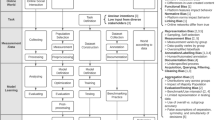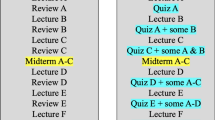Abstract
Ensuring students correctly understand the notion of equality is a fundamental problem in teaching mathematics. Is it possible to teach arithmetic in such a way that students do not misinterpret the equal sign "=" as indicating the result of an arithmetic operation and, consequently, viewing the arithmetic operation symbols (+, -, or x) as systematically meaning perform a computation? The present paper describes the implementation of an experimental arithmetic teaching program (called ACE) drawn up in conjunction with teachers and focusing on these issues. We assessed the program's impact via an experiment involving 1140 experimental group students and 1155 control group students, and using a pretest/posttest design. The experimental group students achieved higher composite arithmetic scores, combining all four subdomains (arithmetic writing, mental computation, word-problem solving, and estimation), than control group students. The effect size, computed using individuals' posttest scores adjusted for pretest scores was d = 0.559. The ACE program was effective in all four subdomains tested; however, it was particularly successful in the arithmetic writing subdomain, especially in writing equalities. The program's effect not only held one year later, it was cumulative, as the benefits produced by following the program in both first and second grade were almost double those of following the program in just one grade.



Similar content being viewed by others
References
Alibali, M. W., Phillips, K. M. O., & Fischer, A. D. (2009). Learning new problem-solving strategies leads to changes in problem representation. Cognitive Development, 24(4), 89–101. https://doi.org/10.1080/15248372.2010.516417.
Bailey, D. H., Nguyen, T., Jenkin, J. M., Domina, T., Clements, D. H., & Sarama, J. S. (2016). Fadeout in an early mathematics intervention: constraining content or preexisting differences? Developmental Psychology, 52(9), 1457–1469. https://doi.org/10.1037/dev0000188.
Barmby, P., Harries, T., Higgins, S., & Suggate, J. (2009). The array representation and primary children’s understanding and reasoning in multiplication. Educational Studies in Mathematics, 70(3), 217–241. https://doi.org/10.1007/s10649-008-9145-1.
Baroody, A. J. (1999). Children’s relational knowledge of addition and subtraction. Cognition and Instruction, 17(2), 137–175. https://doi.org/10.1207/S1532690XCI170201.
Baroody, A. J., & Ginsburg, H. P. (1983). The effects of instruction on children’s understanding of the “equals” sign. The Elementary School Journal, 84(2), 199–212.
Bates, D., Maechler, M., Bolker, B., & Walker, S. (2015). Fitting linear mixed-effects models using lme4. Journal of Statistical Software, 67, 1–48. https://doi.org/10.18637/jss.v067.i01.
Brissiaud, R. (1994). Teaching and development: solving “missing addend” problems using subtraction. European Journal of Psychology of Education, 9(4), 343–365. https://doi.org/10.1007/BF03172907.
Byrd, C. E., McNeil, N. M., Chesney, D. L., & Matthews, P. G. (2015). A specific misconception of the equal sign acts as a barrier to children’s learning of early algebra. Learning and Individual Differences, 38, 61–67. https://doi.org/10.1016/j.lindif.2015.01.001.
Byrd-Hornburg, C., Rieber, M. L., & McNeil, N. M. (2017). An integrative data analysis of gender differences in children’s understanding of mathematical equivalence. Journal of Experimental Child Psychology, 163, 140–150. https://doi.org/10.1016/j.jecp.2017.06.002.
Chesney, D. L., McNeil, N. M., Matthews, P. G., Byrd, C. E., Petersen, L. A., Wheeler, M. C., Fyfe, E. R., & Dunwiddie, A. E. (2014). Organization matters: mental organization of addition knowledge relates to understanding math equivalence in symbolic form. Cognitive Development, 30, 30–46. https://doi.org/10.1016/j.cogdev.2014.01.001.
Cohen, J. (1988). Statistical power analysis for the behavioral sciences (2nd ed.). New York: Taylor & Francis.
Crooks, N. M., & Alibali, M. W. (2014). Defining and measuring conceptual knowledge in mathematics. Developmental Review, 34(4), 344–377. https://doi.org/10.1016/j.dr.2014.10.001.
DeCaro, M. S. (2016). Inducing mental set constrains procedural flexibility and conceptual understanding in mathematics. Memory & Cognition, 44(7), 1138–1148. https://doi.org/10.3758/s13421-016-0614-y.
Dehaene, S. (2011). The number sense (2nd ed.). New York: Oxford University Press.
Dussuc, M. P., Charnay, R., & Madier, D. (2009). Cap maths cycle 2, CE1: Nouveaux programmes. Paris: Hatier.
Fischbein, E. (1989). Tacit models and mathematical reasoning. For the Learning of Mathematics, 9(2), 9–14.
Fischer, J. P., & Tazouti, Y. (2012). Unraveling the mystery of mirror writing in typically developing children. Journal of Educational Psychology, 104(1), 193–205. https://doi.org/10.1037/a0025735.
Fritz, C. O., Morris, P. E., & Richler, J. J. (2012). Effect size estimates: current use, calculations, and interpretation. Journal of Experimental Psychology: General, 141(1), 2–18. https://doi.org/10.1037/a0024338.
Fuchs, L. S., Fuchs, D., Hamlet, C. L., Powell, S. R., Capizzi, A. M., & Seethaler, P. M. (2006). The effects of computer-assisted instruction on number combination skill in at-risk first graders. Journal of Learning Disabilities, 39(5), 467–475. https://doi.org/10.1177/00222194060390050701.
Fuchs, L. S., Powell, S. R., Cirino, P. T., Schumacher, R. F., Marrin, S., Hamlett, C. L., Fuchs, D., Compton, D. L., & Changas, P. C. (2014). Does calculation or word-problem instruction provide a stronger route to prealgebraic knowledge? Journal of Educational Psychology, 106(4), 990–1006. https://doi.org/10.1037/a0036793.
Ginsburg, H. (1977). Children’s arithmetic. New York: Van Nostrand.
Glass, G. V., McGaw, B., & Smith, M. L. (1981). Meta-analysis in social research. Beverly Hills: Sage.
Hattikudur, S., & Alibali, M. W. (2010). Learning about the equal sign: does comparing with inequality symbols help? Journal of Experimental Child Psychology, 107(1), 15–30. https://doi.org/10.1016/j.jecp.2010.03.004.
Jara-Ettinger, J., Piantadosi, S., Spelke, E. S., Levy, R., & Gibson, E. (2017). Mastery of the logic of natural numbers is not the result of mastery of counting: evidence from late counters. Developmental Science, 20, e12459. https://doi.org/10.1111/desc.12459.
Joffredo-Le Brun, S., Morellato, M., Sensevy, G., & Quilio, S. (2018). Cooperative engineering as a joint action. European Educational Research Journal, 17(1), 187–208. https://doi.org/10.1177/1474904117690006.
Kieran, C. (1981). Concepts associated with the equality symbol. Educational Studies in Mathematics, 12(3), 317–326.
Knuth, E. J., Stephens, A. C., McNeil, N. M., & Alibali, M. W. (2006). Does understanding the equal sign matter? Evidence from solving equations. Journal for Research in Mathematics Education, 37, 297–312.
Kreft, I., & De Leeuw, J. (1998). Introducing multilevel modeling. London: Sage Publications.
McNeil, N. M. (2007). U-shaped development in math: 7-year-olds outperform 9-year-olds on equivalence problems. Developmental Psychology, 43(3), 687–695. https://doi.org/10.1037/0012-1649.43.3.687.
McNeil, N. M., Rittle-Johnson, B., Hattikudur, S., & Petersen, L. A. (2010). Continuity in representation between children and adults: arithmetic knowledge hinders undergraduates’ algebraic problem solving. Journal of Cognition and Development, 11(4), 437–457. https://doi.org/10.1080/15248372.2010.516421.
McNeil, N. M., Fyfe, E. R., Petersen, L. A., Dunwiddie, A. E., & Brletic-Shipley, H. (2011). Benefits of practicing 4 = 2 + 2: nontraditional problem formats facilitate children’s understanding of mathematical equivalence. Child Development, 82(5), 1620–1633. https://doi.org/10.1111/j.1467-8624.2011.01622.x.
McNeil, N. M., Fyfe, E. R., & Dunwiddie, A. E. (2015). Arithmetic practice can be modified to promote understanding of mathematical equivalence. Journal of Educational Psychology, 107(2), 423–436. https://doi.org/10.1037/a0037687.
Pinheiro, J., Bates, D., DebRoy, S., Sarkar, D., & R Core Team (2017). nlme: Linear and Nonlinear Mixed Effects Models (R package version 3.1–131). Retrieved from https://cran.r-project.org/web/packages/nlme/nlme.pdf.
Powell, S. R. (2012). Equations and the equal sign in elementary mathematics textbooks. The Elementary School Journal, 112(4), 627–648.
R Core Team. (2015). R: A language and environment for statistical computing. Vienna: R Foundation for Statistical Computing.
Verschaffel, L., Bryant, P., & Torbeyns, J. (2012). Introduction. Educational Studies in Mathematics, 79(3), 327–334. https://doi.org/10.1007/s10649-012-9381-2.
Zieffler, A. S., Harring, J. R., & Long, J. D. (2011). Comparing groups: randomization and bootstrap methods using R. Hoboken: Wiley.
Acknowledgments
We thank all the children and teachers who have taken part in the experimentation. We are also grateful to the experimenters, coders, and administrative officials who have facilitated its performing.
Author information
Authors and Affiliations
Corresponding author
Additional information
Jean-Paul Fischer. Lorraine Laboratory of Psychology and Neuroscience (2LPN), University of Lorraine, 54015 Nancy, France. E-mail: jean-paul.fischer@univ-lorraine.fr
Current themes of research:
Interactive development of procedural and declarative knowledge in the field of number and arithmetic. Mirror writing in typically developing children.
Most relevant publications in the field of Psychology of Education:
Fischer, J. P., (2017, on line). Studies on the written characters orientation and its influence on digit reversal by children. Educational Psychology. https://doi.org/10.1080/01443410.2017.1359239
Fischer J. P., 2017. Does finger sense really have a delayed effect on children’s addition performance? Cognitive Processing, 18(1), 105-106. https://doi.org/10.1007/s10339-016-0782-5
Fischer, J. P. (2015). La distinction procédural/déclaratif appliquée aux premiers apprentissages numériques. In D. Butlen, I. Bloch, M. Bosch, C. Chambris, G. Cirade, S. Clivaz, S. Gobert, C. Hache, M. Hersant & C. Mangiante-Orsola (Eds), Rôles et places de la didactique et des didacticiens des mathématiques dans la société et le système éducatif : vol. I (pp. 97-122). Grenoble : La Pensée Sauvage.
Fischer, J. P. (2015). Commentary: Development of magnitude processing in children with developmental dyscalculia: space, time, and number. Frontiers in Psychology (Developmental Psychology), 6:804.https://doi.org/10.3389/fpsyg.2015.00804
Fischer, J. P., & Tazouti, Y. (2012). Unraveling the mystery of mirror writing in typically developing children. Journal of Educational Psychology, 104(1), 193-205. https://doi.org/10.1037/a0025735
Emmanuel Sander. Developmental psychology and educational sciences, IDEA Lab, University of Geneva. Email: emmanuel.sander@unige.ch
Current themes of research:
Arithmetical word problem-solving. Analogical reasoning.
Most relevant publications in the field of Psychology of Education:
Brissiaud, R., & Sander, E., (2010). Arithmetic word problem solving: a situation strategy first framework. Developmental Science, 13(1), 92-107. https://doi.org/10.1111/j.1467-7687.2009.00866.x
Gamo, S., Nogry, S., & Sander, E. (2014). Apprendre à résoudre des problèmes en favorisant la construction d'une représentation alternative chez des élèves scolarisés en éducation prioritaire. Psychologie française, 59(3),https://doi.org/10.1016/j.psfr.2014.02.002.
Gamo, S., Sander, E., & Richard, J. F. (2010). Transfer of strategy use by semantic recoding in arithmetic problem solving. Learning and Instruction, 20(5), 400-410. https://doi.org/10.1016/j.learninstruc.2009.04.001
Hofstadter, D., & Sander, E. (2013). Surfaces and essences: analogy as the fuel and fire of thinking. Philadelphia: Basic Books.
Gérard Sensevy. Educational Sciences, CREAD Laboratory, University Bretagne Occidentale. E-mail: gerard.sensevy@espe-bretagne.fr
Current themes of research:
Didactics, teaching and learning, and their relationships.
Most relevant publications in the field of Psychology of Education:
Sensevy, G., Forest, D., Quilio, S. & Morales, G. (2013). Cooperative engineering as a specific design-based research. ZDM - The International Journal on Mathematics Education, 45(7), 1031-1043. https://doi.org/10.1007/s11858-013-0532-4
Sensevy, G., Mercier, A., Schubauer-Leoni, M.L., Ligozat, F. & Perrot, G. (2005). An attempt to model the teacher’s action in mathematics. Educational Studies in Mathematics, 59(1), 153-181. https://doi.org/10.1007/s10649-005-5887-1
Sensevy, G., Quilio, S., & Mercier, A. (2015). Arithmetic and comprehension at elementary school. In X. Sun, B. Kaur, & J. Novotná (Eds.), The twenty-third ICMI study: Primary mathematics study on whole numbers (pp. 472-479). Macau (China): University of Macau.
Bruno Vilette. Developmental Psychology, PSITEC Laboratory, University Lille. E-mail: bruno.vilette@univ-lille3.f
Current themes of research:
Numerical cognition and development.
Most relevant publications in the field of Psychology of Education:
De Clercq-Quaegebeur, M., Rassel, A., Casalis, S., Vilette, B., Lemaitre, M.-P. & Vallée, L. (2017). Arithmetic abilities in children with developmental dyslexia : Performances on French ZAREKI-R Test. Journal of Learning Disabilities.https://doi.org/10.1177/0022219417690355
Vilette, B. (2016). Effets d'entraînements basés sur l'estimation numérique auprès d'enfants avec une dyscalculie ou des troubles du calcul. Développements, 20-21, 57-77.
Jean-François Richard. Paragraphe Laboratory, University Paris 8. E-mail: jf.richard.paris8@gmail.com
Current themes of research:
Modelling problem-solving behavior. Role of problem-solving activity in learning mathematics. Analysis of errors as a tool for cognitive diagnosis.
Most relevant publications in the field of Psychology of Education:
Richard, J. F., & Sander, E. (2000). Activités d’interprétation et de recherche de solution dans la résolution de problème. In J. N. Foulin & C. Ponce (Eds) Lire, écrire, compter, apprendre : les apports de la psychologie des apprentissages. Bordeaux : CRDP d’Aquitaine.
Gamo, S., Sander, E., & Richard, J. F. (2010). Transfer of strategy use by semantic recoding in arithmetic problem solving. Learning and Instruction, 20(5), 400-410. https://doi.org/10.1016/j.learninstruc.2009.04.001
Mengue-Metoule, E., Richard, J. F., & Sander, E. (2015). Classification des problèmes additifs : statut intermédiaire de la transformation relativement au complément et à la comparaison. L’année psychologique, 115(4), 497-531.
Electronic supplementary material
ESM 1
(DOCX 1607 kb)
Rights and permissions
About this article
Cite this article
Fischer, JP., Sander, E., Sensevy, G. et al. Can young students understand the mathematical concept of equality? A whole-year arithmetic teaching experiment in second grade. Eur J Psychol Educ 34, 439–456 (2019). https://doi.org/10.1007/s10212-018-0384-y
Received:
Revised:
Accepted:
Published:
Issue Date:
DOI: https://doi.org/10.1007/s10212-018-0384-y




